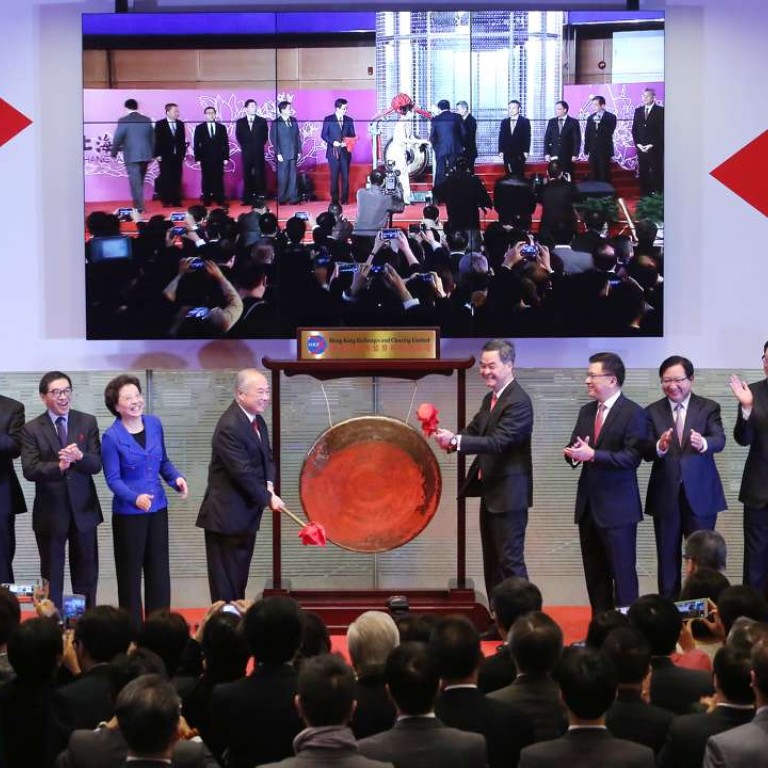
Mainland Chinese investors lukewarm on Shenzhen-Hong Kong connect, say brokers
Mainland Chinese investors are taking a lukewarm approach towards the Shenzhen-Hong Kong stock connect scheme set to open Monday, with most of them expected to stay on the sidelines in the short term.
Despite efforts by regulators to conduct freer cross-border fund flows through the Hong Kong and mainland stock markets, mainland investors may still focus on A shares because they are betting on a strong rebound after more than a year of flat trading.
“Individual investors have snubbed the new system and only a tiny portion of them would participate in the trading of H shares,” said Wei Wei, an analyst with Huaxi Securities. “Institutional investors are likely to earmark part of funds for some good buys in Hong Kong.”
The Shenzhen-Hong Kong stock link system, to be officially launched on Monday, will enable mainland investors to directly trade 417 stocks in Hong Kong, about 100 more than the similar scheme that connects the Hong Kong stock exchange with its Shanghai counterpart.
However, brokerages said the number of accounts opened to trade Hong Kong listed stocks via the scheme was less than 1 per cent of the number of active accounts to trade A shares.
Two years ago the system linking Shanghai and Hong Kong stock exchanges made its debut, a groundbreaking move by Beijing to open the nation’s equity markets to international investors.
The inauguration of the Shenzhen-Hong Kong trade link is touted as another concrete step China has taken toward liberalising its volatile stock market which is known for rampant speculation.
The arbitrage system didn’t seem to work after two years of the Shanghai-Hong Kong connect
The southbound trading that lets mainland investors buy H shares via Chinese brokers creates opportunities for mainland investors to access cheaper H shares of dual-listed companies on both sides of the border.
According to China Merchants Securities, an additional 17 companies listed on both the mainland and Hong Kong exchanges will be included in the Shenzhen-Hong Kong connection.
China’s A shares are now trading at a more than 20 per cent premium to their H-share counterparts.
“The arbitrage system didn’t seem to work after two years of the Shanghai-Hong Kong connect,” said Feng Tao, a Shanghai-based retail investor who participated in the Shanghai-Hong Kong trading link. “The Shenzhen-Hong Kong programme won’t make much difference to us at all.”
Tao began focusing on chasing gains on the A-share market starting in the middle of this year, amid expectations that a turnaround would soon occur.
China’s A-share market has been in a slump since late 2015 when a market rout wiped out US$5 trillion in capitalisation, leaving millions of retail investors holding an “empty bag”.
Speculation about a rebound on the A-share market is mounting with the more bullish institutions predicting the benchmark indicator could jump 30 per cent in 2017 buoyed by expectations of an economic recovery.
On the mainland, investors gauge market sentiment by liquidity, believing that rising turnover is an auspicious sign of a market rally with strength. On the Shanghai stock exchange, the daily trading value in November was nearly double that of September.
Under the Shenzhen-Hong Kong stock link, 881 A-share companies, including hundreds of small-cap stocks traded in Shenzhen, can be traded by international investors via Hong Kong brokers, nearly 300 more than the Shanghai-Hong Kong programme.
There will be no total quota set for the new scheme, which means that investors on both sides can trade shares freely on each other’s markets.
“Mainland investors are expecting an influx of overseas capital when the new system starts,” said Zhou Ling, a hedge fund manager with Shanghai Shiva Investment. “They will ignore the valuation and fundamentals while hoping to profit from the volatility in A shares.”
China Merchants Securities said in a research report that given the initial lukewarm attitude of mainland investors toward H shares, the A-to-H-share price gap wouldn’t be eliminated anytime soon.
Tan Jialong, director of Zendai Group’s investment division, said mainland investors would eventually become fully aware of the H shares’ investment value.
“Relatively speaking, H shares are cheaper than A shares with some blue-chip stocks proving to be worth buying,” he said. “The new system will also pave a way for further connection schemes that link the mainland stock market with those in New York and London.”

